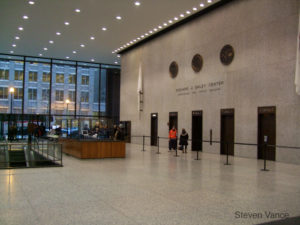The Clerk of the Court Should Serve the Community
 The Clerk of the Court of Cook County has considered—and apparently rejected—a policy change that would have charged all parties to receive the first copy of any order issued in their case. At Chicago Appleseed and the Chicago Council of Lawyers, we are glad to learn that this policy won’t be adopted because it is short-sighted and, rather than focus on improving court functions and increasing efficiencies, would have resulted in funding court services on the backs of pro se litigants or by passing fees through attorneys to clients.
The Clerk of the Court of Cook County has considered—and apparently rejected—a policy change that would have charged all parties to receive the first copy of any order issued in their case. At Chicago Appleseed and the Chicago Council of Lawyers, we are glad to learn that this policy won’t be adopted because it is short-sighted and, rather than focus on improving court functions and increasing efficiencies, would have resulted in funding court services on the backs of pro se litigants or by passing fees through attorneys to clients.
The proposal that the practice of using carbon copies of orders be replaced with a fee- for-receipt-of-order regime may be penny-wise, but it is certainly pound-foolish. This proposal was a reactive attempt to fix funding issues and stalled modernization plans. Cook County lags behind other jurisdictions of comparable size in electronic access to records, electronic filing, and reporting of court statistics.
By funding programs to assist pro se litigants, Cook County could yield significant savings in its courts. This is a better approach than raising fees on pro se litigants. The state of California, for instance, funds self-help services in all 58 trial courts because research shows that self-help center workshops save $1.00 for every twenty-three cents spent. When the court provides one-on-one individual assistance to self-represented litigants, expenditures between thirty-six and fifty-five cent net savings of $1.00.
Although Cook County’s E-filing program has been slow to take hold, electronic records will save money in the long run and can easily be integrated into services for pro se litigants. But e-filing is not the most important part of court modernization. As the National Center for State Courts points out: too often e-filing systems focus on capturing documents exactly as they have always been presented to courts, rather than focusing on capturing the information in a case file so it is readily accessible to judges, clerks and litigants.
A holistic modernization plan also considers court administration. For instance, Utah uses its technology to create weekly public reports of case filings, case dispositions and judgments. Florida offers a web-portal for comprehensive court statistics as part of its technology projects.
The Clerk of the Court must consider the needs of all its constituent groups as it seeks cost-reductions and develops a modernization plan. The Clerk’s office serves the judges and staff of the courts, the attorneys and staff of law firms, and litigants whether or not they have attorneys . However, the Clerk of the Court also has a duty to the public. We recognize the need to raise money and hope that the Clerk will do so in a way that facilitates access to justice and improves information about the court. Implementation of the above mentioned practices could do both.
